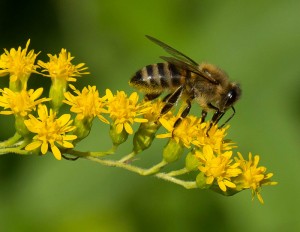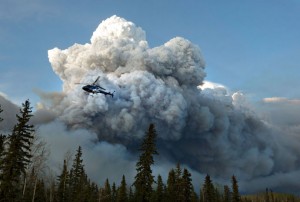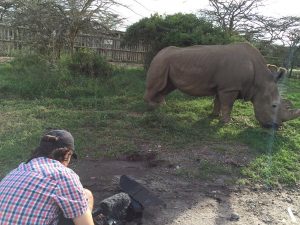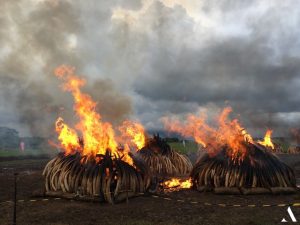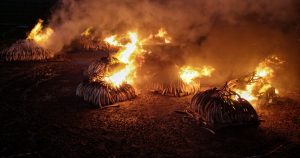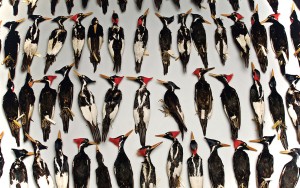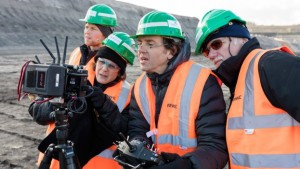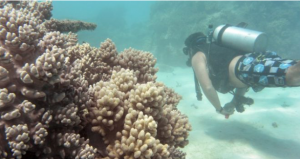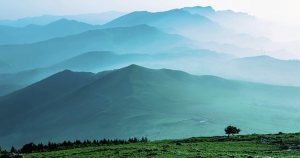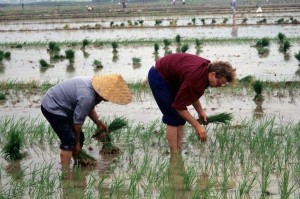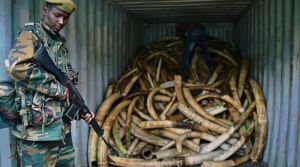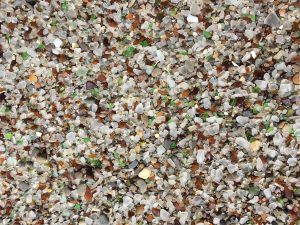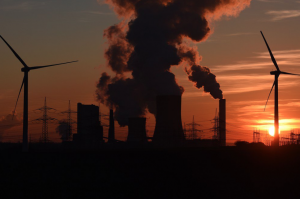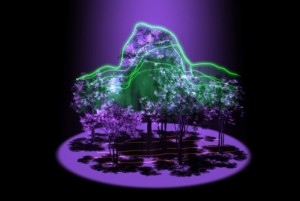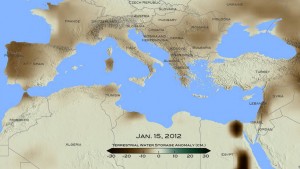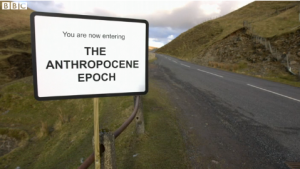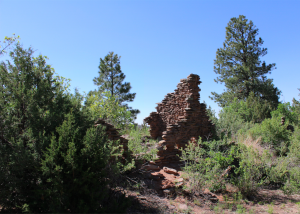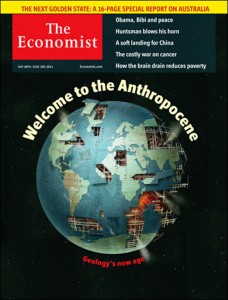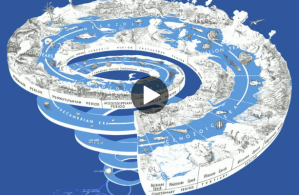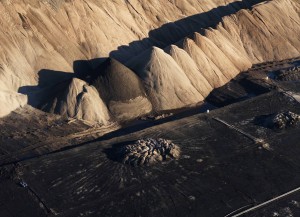
First report of all the world’s plants finds 1 in 5 species facing extinction
By Ben Guarino | The Washington Post | May 10, 2016 Plants pervade almost every part of human life — not only do we eat them and wear them, we use plants for fuel, medicine, building materials, poisons and intoxicants. To limit the world’s plants to those that meet a human need, however, would be doing the leafy kingdom a…
Read MoreHow Rising CO2 Levels May Contribute to Die-Off of Bees
By Lisa Palmer | Yale Environment 360 | May 10, 2016 Specimens of goldenrod sewn into archival paper folders are stacked floor to ceiling inside metal cabinets at the Smithsonian National Museum of Natural History. The collection, housed in the herbarium, dates back to 1842 and is among five million historical records of plants from around…
Read MoreExplaining the Anthropocene: Ian Angus on how human activity is transforming the entire planet
By Ian Angus | Socialist Review | May 6, 2016 Anthropocene is the proposed name for the present stage of Earth history: a time in which human activity is transforming the entire planet in unprecedented and dangerous ways. Scientists divide Earth’s 4.5 billion year history into time intervals that correspond to major changes in the conditions…
Read MoreFort McMurray and the Fires of Climate Change
By Elizabeth Kolbert | The New Yorker | May 5, 2016 The town of Fort McMurray, some four hundred miles north of Calgary, in Canada, grew up very quickly on both sides of the Athabasca River. During the nineteen-seventies, the population of the town tripled, and since then it has nearly tripled again. All this growth…
Read MoreSpending Some Time at Ol Pejeta
Spending some time at @OlPejeta with Sudan, the last remaining male northern white rhino. pic.twitter.com/W8HUdJj8ih — Anthropocene Project (@anthropocene) May 4, 2016 Learn more about the Northern White Rhinos at Ol Pejeta, HERE.
Read MoreThe KWS Ivory Burn – A Sneak Peek of Our Drone Footage
On Saturday, April 30, 2016 the Anthropocene team was in Nairobi National Park among African officials, celebrities and passionate citizens to document the burning of the largest stockpile of elephant ivory and rhino horn in history. We are deeply grateful to the Kenya Wildlife Service, Kenya Film Commission and the High Commission of Canada for their efforts to…
Read MoreESSAY: Ghosts and tiny treasures
By Bryan Pfeiffer | Aeon Ten years ago this spring, in the darkness before dawn, I switched on my headlamp, dialled in my compass, and set forth into a chilly Arkansas swamp. Dressed head to toe in camouflage and lugging an arsenal of camera gear, I wandered alone that day through lowlands of oak, cypress and sycamore,…
Read MoreTelefilm, Rogers invest $1.6M across six docs
By Camille Gushy | Playback | April 27, 2016 Anthropocene (pictured) from Jennifer Baichwal and Edward Burtynsky was among the projects to receive funding through the Theatrical Documentary Program. Read more on Playback.
Read MoreWomen filmmakers in the spotlight as Telefilm Canada and the Rogers Group of Funds announce their support of six homegrown theatrical documentaries
Telefilm Canada | April 26, 2016 Including documentaries by Academy Award-winning director Brigitte Berman, acclaimed writer-directors Jennifer Baichwal, Julie Lambert and Ann Shin, and veteran producers Trish Dolman and Betsy Carson. Read the full release on Telefilm.ca.
Read MoreChanging the Face of the Earth
By Dr. Colin Waters | LaboratoryNews | April 12, 2016 We have geo-engineered the Earth expertly for our own ends, but will humanity’s indelible stamp on the planet define an entire geological epoch? The term “Anthropocene” was coined by Paul Crutzen 16 years ago to mark the present as distinct from previous geological time. The term has…
Read MoreEvolving Toward a Better Anthropocene
By Erle Ellis | The Breakthrough Institute | April 4, 2016 Humans have now transformed Earth to such a degree that a new epoch of geologic time, the Anthropocene, may soon mark the emergence of humanity as a “great force of nature.” The big question is why? Why did humans, and no other single multicellular species…
Read MoreKenyan Wildlife Authorities Prepare to Torch Ivory to Deter Poaching
By Ben Curtis | The Globe and Mail | April 4, 2016 Kenyan wildlife authorities Monday started moving at least 105 tons of ivory and one ton of rhino horn in preparation for the torching of the items at the end of the month to discourage ivory and rhino-horn trade believed to be fuelling poaching of…
Read MoreTechnofossil Beach
Technofossil beach, Fort Bragg, California pic.twitter.com/MnlffdUnxP — Anthropocene Project (@anthropocene) April 2, 2016
Read MoreGeneration Anthropocene: How Humans Have Altered the Planet for Ever
By Robert Macfarlane | The Guardian | April 1, 2016 In 2003 the Australian philosopher Glenn Albrecht coined the term solastalgiato mean a “form of psychic or existential distress caused by environmental change”. Albrecht was studying the effects of long-term drought and large-scale mining activity on communities in New South Wales, when he realised that no word…
Read MoreIs It Game Over for Coal?
By Emma Foehringer Merchant | New Republic | March 18, 2016 Last Friday, Oregon became the first state to ban coal outright, passing a bill that will phase out any electricity generated by coal by 2035. Several days earlier, the U.S. Energy Information Administration (EIA) reported that 80 percent of last year’s retired electricity was coal-powered. In 2016, natural gas…
Read MoreThe Early Anthropocene Hypothesis: An Update
By Bill Ruddiman | RealClimate | March 15, 2016 For over a decade, paleoclimate scientists have argued whether the warmth of the last several thousand years was natural or anthropogenic. This brief comment updates that debate, also discussed earlier at RC: Debate over the Early Anthropogenic Hypothesis (2005) and An Emerging View on Early Land Use (2011). The graph…
Read MoreThe Case for Optimism on Climate Change | Al Gore TED 2016
Why is Al Gore optimistic about climate change? In this spirited talk, Gore asks three powerful questions about the man-made forces threatening to destroy our planet — and the solutions we’re designing to combat them. (Featuring Q&A with TED Curator Chris Anderson)
Read MoreAnthropocene: The Human Age
By Richard Monastersky | Nature | March 11, 2016 Almost all the dinosaurs have vanished from the National Museum of Natural History in Washington DC. The fossil hall is now mostly empty and painted in deep shadows as palaeobiologist Scott Wing wanders through the cavernous room. Wing is part of a team carrying out a radical,…
Read MoreSatellite Laser Will Map Forests in 3-D
By Brittany Patterson | Scientific American | March 8, 2016 In 2018, America’s space agency is going to send a laser into the galaxies to assess the world’s trees. It won’t be the first time NASA dabbles in lidar technology—shooting lasers onto things and recording what comes back—but it will be the first time the agency…
Read MoreNASA Finds Drought in Eastern Mediterranean Worst of Past 900 Years
NASA | March 1, 2016 In addition to identifying the driest years, the science team discovered patterns in the geographic distribution of droughts that provides a “fingerprint” for identifying the underlying causes. Together, these data show the range of natural variation in Mediterranean drought occurrence, which will allow scientists to differentiate droughts made worse by…
Read MoreIn Search of the Anthropocene Epoch
BBC News | February 26, 2016 For more than 11,000 years, we have been living in a period of geological time called the Holocene. But researchers say our planet is undergoing a rapid transition, so much so that we have shifted into a new epoch: the Anthropocene, the age of humans. Continue reading and watch…
Read MoreUN Science Report Warns of Fewer Bees, Other Pollinators
By Seth Borenstein | WTop | February 26, 2016 WASHINGTON (AP) — Many species of wild bees, butterflies and other critters that pollinate plants are shrinking toward extinction, and the world needs to do something about it before our food supply suffers, a new United Nations scientific mega-report warns. Continue reading on WTop.
Read MoreNew Evidence Shows Global Climate Change Began Way Back in 1610
By Eric Holthaus | Slate | February 17, 2016 With evidence mounting that humanity has become a true force of nature “as Earth-changing as a meteorite strike,” it’s natural to wonder just exactly when our collective influence over our home planet’s environment became so dominant. That question has sparked a roaring debate among scientists that’s led to an effort to…
Read MoreThe Anthropocene: Great Marketing, Wrong Product
By Brad Allenby | Slate | February 8, 2016 It was in 2011 that the Economist, a publication usually known for arcane speculation on geopolitics and economics, welcomed its readers to the Anthropocene and warned that humans had “changed the way the world works.” The drumbeat behind the concept has continued, recently receiving new momentum with the release in…
Read MorePODCAST: Congratulations, We are Likely the Anthropocene
The John Batchelor Show | February 5, 2016 Listen to the podcast on Audioboom.
Read MoreThrilled to be Collaborating with Deep Inc.
Thrilled to be collaborating with the @DeepDispatches team on #VR content for Anthropocene! https://t.co/bPmq606T9t pic.twitter.com/7ea8Bg2T9U — Anthropocene Project (@anthropocene) February 5, 2016
Read MoreWhat Future Humans Will Learn From Our Remains
By Yasmin Tayag | Inverse | February 3, 2016 Millions of years from now, a future geologist will be digging deep into the Earth, seeking the truth about his notorious sapiens heritage. Excavating far beneath the year 100,000, scraping past 10,000, he’ll hit on 2016 and think: What the actual fuck happened here? A recent paper written by researchers with…
Read MoreAnthropocene Writing Room
Anthropocene documentary writing room with the Edward Burtynsky research crew. Big plans for shoots this year!
Read More
